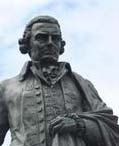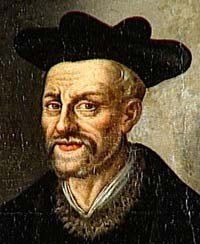
The concept of Tax Freedom Day was first posited by The Tax Foundation, a US educational body, and identifies the day when, if you paid your taxes continually from January 1st, you would stop paying taxes and start earning for yourself. This year, Tax Freedom Day was 23 April in the US, a
 nd 2 June in Great Britain (calculated by the Adam Smith Institute). I expect many will await the setting of next year's tax freedom days in various countries, as a measure of how the present crises have impacted on taxpayers.
nd 2 June in Great Britain (calculated by the Adam Smith Institute). I expect many will await the setting of next year's tax freedom days in various countries, as a measure of how the present crises have impacted on taxpayers.In the context of skyrocketing taxes, The Sentinel Stars by Louis Charbonneau poses a unique but dystopian solution to the dilemma of one's tax burden being so high that working it off within one's lifetime may not be an option. Written in 1963, the book is set in a post-apocalyptic world where babies are born with the inheritance of their parent's tax burden, which they must work off - in addition to the tax they accrue through their lifetimes themselves - before they can become Freemen, if they live that long. (Alternatively, a lucky few are Freemen at birth, as they are born with an inheritance which is in credit.)
At 156 pages, The Sentinel Stars is shorter than a Mills and Boon novel, but, like much speculative fiction from the mid-50's to around the mid-70's, is bursting with ideas.
TRH-247 is the 247th person to be born with the name Thomas Robert Hendley in the Organisation, an outfit roughly analogous to Oceania in George Orwell's Nineteen Eighty-Four, with the difference that conflict has ended in TSS with the Merger of East and West.
Thomas meets Anne, loses her, and meets her again when he is sent to a Freedom Camp for a day as moral therapy - his importunity having been to go for a walk when he should have been at work. Having looked at some extreme sports, such as golf, he finds himself in a nightclub where the clientéle are in search of more lubricious pastimes. Anne explains:
"I have long legs and I'm athletic and I can dance. And I have a pretty face. I was picked out when I was ten years old. Every day since then I've done the right exercises and eaten the right foods and had the right creams massaged into me. Every day! Some of the girls are lucky. They stop growing too soon, or they get dumpy or their skin ages too quickly, or they just don't turn out to be as pretty as they seemed in the beginning. They're transferred out of out section. I wasn't."Like Rabelais' Abbey of Thélème, there are no clocks in the Freedom camp, and no rule
 s. Thomas, stuck in the Freedom Camp, is besieged by terrible freedom on every side, and finds himself dreaming of a return to too much government to escape the anarchy of too little. Eventually a doctor in the camp arrives at a diagnosis explaining his inability to accept the Organisation's norms. Genetic therapy, which is usually inflicted on the unborn disguised as prenatal screening, has not taken in Thomas' case. He is normal.
s. Thomas, stuck in the Freedom Camp, is besieged by terrible freedom on every side, and finds himself dreaming of a return to too much government to escape the anarchy of too little. Eventually a doctor in the camp arrives at a diagnosis explaining his inability to accept the Organisation's norms. Genetic therapy, which is usually inflicted on the unborn disguised as prenatal screening, has not taken in Thomas' case. He is normal.Surprisingly, illicit drugs feature only marginally in the novel. A habit-forming opiate called "the weed" is smuggled into Freedom Camps - Thomas asks, rather naively, "here there are no pressures, no worries, no frustrations. Why would anybody be driven to using drugs?" He appears unaware that in describing an anomic society he's answered his own question.
Unfortunately, drugs are a pedestrian reality in our real-life world and infest all walks of life. However, some professions are liable to do more harm when under the influence of mind-altering substances than others. Just over a fortnight before the Northern Rock privatisation story broke, the Financial Times published a piece by Stanley Pignall about drug use at work, in which Pignal stated: "The new data suggest cocaine use is no longer limited to bankers working long hours. Suspicions of widespread drug use in the City are common, but few firms conduct random drug tests." US lawyer and political scientist Ted Becker describes the additional obstacles law enforcers face in bringing higher-functioning drug users to book:
Apparently, the U.S. Drug Enforcement Administration (DEA) had set up a sting operation with the intent of ensnaring a large number of overwhelmingly white professionals - lawyers, physicians, stockbrokers, professors, CEOs - in a cocaine ring. They were the “buyers” who called the dealers and had amounts of pure powder cocaine delivered to their homes in New York City like pizzas...The DEA had hard evidence on all these elite buyers including “wiretaps, on videotape, on phone records.” It had taken a year to obtain all this evidenceHowever the present crisis is resolved, whether it be through a Capitalism 2.0 or by some other means, I think the best we can hope for is stronger structures in place to buffer the bust which will follow the next boom. Those dealers (by no means all of them) who have projected their comedown onto society as a whole will not be caught. If, for example, they were asked to give a hair sample, they would reinvent the skinhead hairstyle.
...The result: “Prosecutors are contemplating stern letters to the suspects warning them to keep their noses clean” (Barrett 2001). “Sources say that since the dealer’s arrest...many of the buyers have hired lawyers who have bombarded officials with phone calls, insisting their clients not be charged...”
Maybe I'm being too pessimistic. After all, life's stranger than fiction.
The Sentinel Stars
Louis Charbonneau
pp 155
Bantam, 1963 (US)
Corgi, 1964 (UK)











No comments:
Post a Comment
Please feel free to leave a comment - Frugal Dougal.